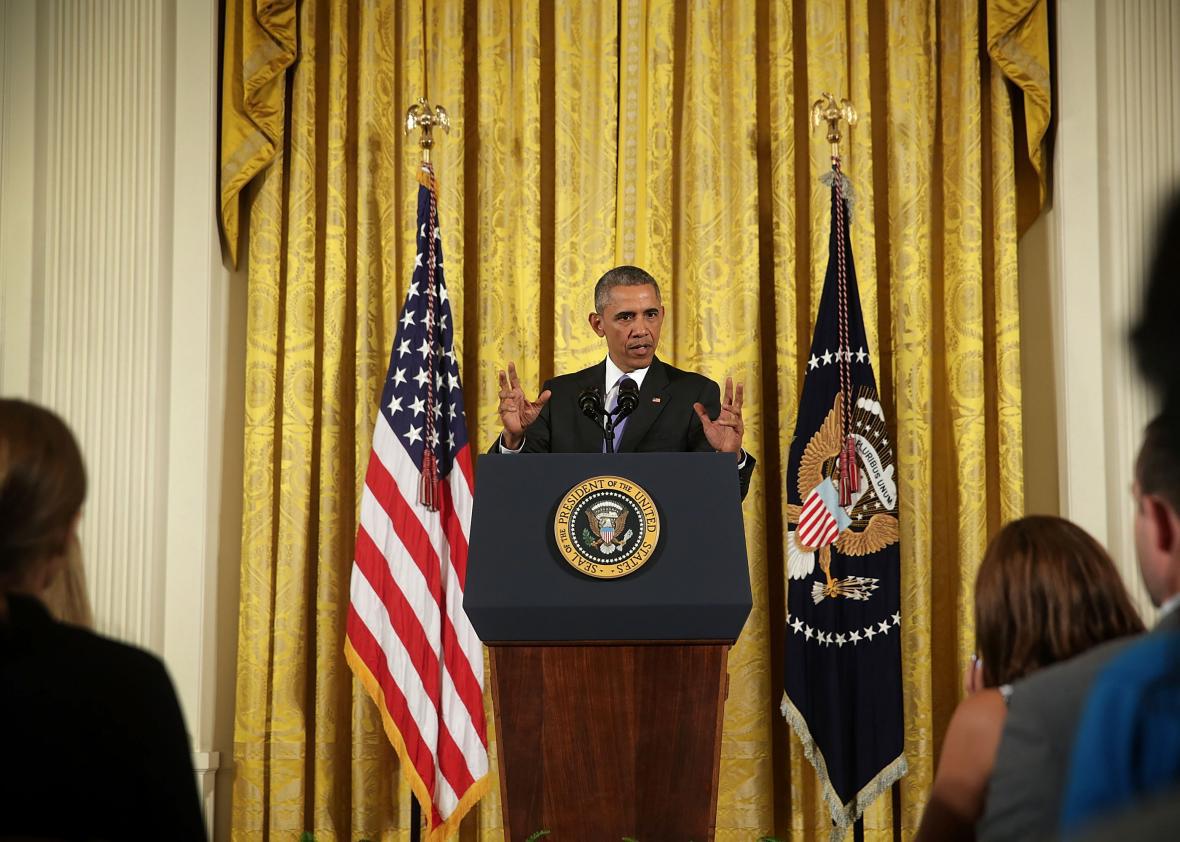In a news conference today, President Obama began the process of selling the just-negotiated deal over Iran’s nuclear program ahead of a likely rancorous debate in Congress.
Obama dismissed the argument that the deal will make it easier for Iran to obtain a nuclear weapon, saying it “defies logic.” And, echoing his longtime position on negotiating, Obama challenged critics, including Republican members of Congress and Israeli Prime Minister Benjamin Netanyahu, to present an alternative other than war. “There really are only two alternatives here. Either the issue of Iran obtaining a nuclear weapon is resolved diplomatically through a negotiation or it’s resolved through force,” he said. To those who charge that the deal leaves too much of Iran’s nuclear infrastructure in place, he countered, “we don’t have diplomatic leverage to eliminate every vestige of a peaceful nuclear program in Iran.”
Asked about the 24-day period for inspectors to check on suspected undeclared nuclear sites, which Netanyahu compared this morning to “giving a drug dealer 24 days’ notice before you inspect the premises,” Obama noted that Iran’s known reactors are subject to daily inspection, which would make potential violations easy to monitor. If violations were detected, Iran would have “some ‘splaining to do,” noted the president, who also argued that nuclear weapons development facilities are “not something you hide in a closet. This is not something you put on a dolly and wheel off somewhere.”
Asked about Syrian President Bashar al-Assad’s praise of the deal as a “great victory,” Obama said, “it does not give me pause that Mr. Assad or others in Tehran may be trying to spin the deal in a way that they think is favorable to what their constituencies want to do. That’s what politicians do.”
On the question of the weapons embargo on Iran, which was one of the final sticking points of negotiations, Obama says the negotiators were comfortable allowing it to expire after five years because “We have a number of mechanisms under international law that give us the authority to interdict arms shipments by Iran. … We have other U.N. resolutions that prohibit arms sales by Iran to organizations like Hezbollah.”
He said that while he hopes the deal induces Iran to “behave differently in the region, to be less aggressive, less hostile, more cooperative,” it is designed to solve “one particular problem” and he does not expect the country to start “suddenly acting like a liberal democracy.”
When asked whether Iran and the U.S. could work together to resolve conflicts such as the civil war in Syria, Obama said, “I do agree that we’re not going to solve the problems in Syria unless there’s buy-in from the Russians, the Iranians, the Turks and our Gulf partners,” but he noted that “unlike the Cuba situation, we’re not normalizing diplomatic relations” and he doesn’t foresee formal cooperation between the U.S. and Iran in fighting against ISIS. (Though a de facto partnership is already pretty much in place.)
Things got a bit testy when Major Garrett of CBS asked why the president was “content with all the fanfare around the deal to leave the conscience of this nation, the strength of this nations unaccounted for” with Americans still imprisoned on trumped up charges in Iran. Saying that he would continue to press for their release and that linking the two issues would have been counterproductive, Obama said, “The notion that I am content to celebrate with Americans languishing in jail, Major, that’s nonsense and you should know better.”
As for what’s next: Obama says he expects a debate “based on facts” in Congress but was “not betting on the Republican Party rallying behind this agreement.” The White House has five days to certify the agreement after which Congress will have 60 days to review it, and, if it opposes the deal, pass a resolution to block it. Obama has already promised to veto such a resolution and it seems extremely unlikely that Republican opponents in the Senate can attract enough Democratic votes to override him.
The president sounded confident today, and can probably afford to be. He described the deal with Iran as having been negotiated from a “position of strength,” a phrase that could also probably describe his position in the upcoming fight on Capitol Hill.
